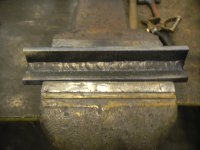I have a Hobart 190 welder that's been good to me. I had a 175 before this one, and it was also good. Hobart = Miller. Can't go wrong. I think there is a smaller 110/220v welder. Use on 110 immediately, and for lighter stuff, but if you eventually want to add 220v, you can then weld heavier stuff, at least in the shop. Bit more investment up front, but less in the long run than buying a different welder...
I also have an Eastwood plasma cutter. It's 110/220, and works well off my 110 generator. (With air from the Jeep's OBA setup...) It's been good to me, and Eastwood offers a great warranty.
Looks like they have a 110v mig welder on sale right now for $260.
Eastwood -MIG Welder | MIG Welders | MIG Welding Cart | MIG Welding Machine & Accessories I'd not be afraid to buy a welder from them. (Oooh, 10% more off if you sign up for emails, according to the ad that just popped up! That is a GREAT deal!!)
Flux core wire itself is a bit more expensive, but works outside, in some wind even. No messing with gas, learning not to stick the rod, etc... Just set the voltage and speed per the chart, and squeeze the trigger. You'll be making good welds in no time at all! If you eventually decide you want cleaner welds, most MIG welders can have a small gas bottle added. Then you use cheaper solid wire, but no welding if there's a breeze...
And I'll add that on a farm, you'll quickly find the need for a larger welder... 110v really won't like welding much thicker than 1/8", in my experience... Even my 220v welder starts getting "fussy" above 1/4", and I have to pre-heat, or do multiple passes, which is really just pre-heating... Perhaps a small 110v welder for portability, and keep an eye out for a 220v stick welder, like an old lincoln "tombstone". The stick welder takes some practice, but you can weld pretty thick metal with one... Good for implements and tractors that have seen a LOT of use, and break larger parts...
Good luck!!
